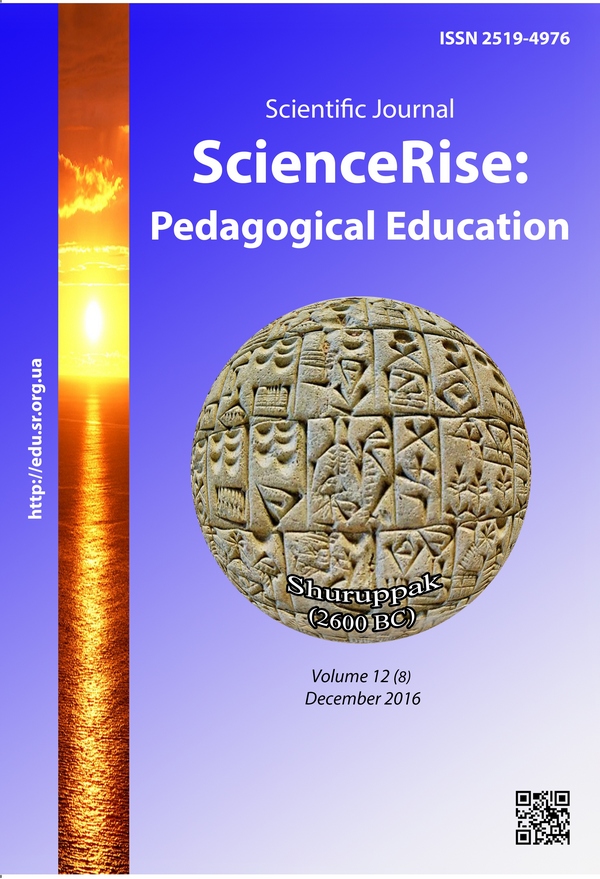The analysis of the features of training of the teacher of XXI century in the light of European integration processes
DOI:
https://doi.org/10.15587/2519-4984.2016.87748Keywords:
globalization, new technologies, European identity, knowledge, multiculturalism, competence, quality, professionalismAbstract
The theoretical approaches to the problem of reformation of pedagogical education, requirements of the preparation of teacher of new generation, who must have the high professionalism, European culture and competence of the teacher of XXI century and the role of universities in preparation of pedagogical staff under conditions of entering in united European space of higher education are considered in the article.
The main components that the teacher of XXI century must have, professional requirements that allow teacher become a full-value citizen of the Europe of knowledge, to be a competitive specialist in pedagogical branch and realize own creative potential in any European or World state were defined.
The article deals with traditional and new requirements to the teachers that must be formed in all links of pedagogical education to guarantee the teachers’ ability to work effectively in European educational space
References
- Andrushhenko, V. P. (2003). Osvita na rubezhi stolit': filosofija, metodologija, praktyka. Neperervna profesijna osvita: filosofija, pedagogichni paradygmy, prognoz. Kyiv: Naukova dumka, 99–166.
- Stepko, M., Klymenko, B., Tovazhnjans'kyj, L. (2004). Bolons'kyj proces i navchannja vprodovzh zhyttja. Kharkiv, 110.
- Vasyljuk, A., Pacohyns'kyj, R., Jakovec', N. (2002). Suchasni osvitni systemy. Nizhyn, 140.
- Vul'fson, B. (1990). Strategija razvitija obrazovanija na Zapade na poroge XXІ veka. Moscow: Izd-vo URAO, 208.
- Karpenchuk, S. G. (2013). Filosofija osvity. Kyiv: Slovo, 687.
- Klepko, S. F. (2006). Filosofija osvity v jevropejs'komu konteksti. Poltava: POIPPO, 328.
- Kremen', V. (2003). Filosofija osvity XXI stolittja. Shljah osvity, 2, 2–6.
- Puhovs'ka, L. (1997). Profesijna pidgotovka vchyteliv u Zahidnij Jevropi: spil'nist' i rozbizhnosti. Kyiv: Vyshha shkola, 179.
- Council of Europe. European Commission (2007). Communication from the European Commission to the European Parliament: Improving the Quality of Teacher Education. Brussels.
- Subina, O. O. (2013). Jevropejs'kyj vymir pedagogichnoi' osvity v 21 stolitti. Jednist' navchannja i naukovyh doslidzhen' – golovnyj pryncyp universytetu. Kyiv: Vyd-vo NPU imeni M. P. Dragomanova, 101–102. Available at: http://enpuir.npu.edu.ua/bitstream/123456789/4770/1/Subina.pdf#page=1&zoom=auto,-129,441
- Dearden, R. F. (1980). Theory and Practice in Education. Journal of Philosophy of Education, 14 (1), 17–29. doi: 10.1111/j.1467-9752.1980.tb00536.x
- European Union. Key Competencies for Life learning. Recommendation of the European Parliament and to the Council of 18 December 2006 (2006/962/EC) (2006). Official Journal of the European Union, I.394/10–I.394/18.
- European Commission. Common European Principles for Teacher Competencies and Qualifications (2005). Brussels: European Commission.
- OECD. The Definition and Selection of Key Competencies. Executive Summary. Available at: http://www.oecd.org/dataoecd/47/61/35070367.pdf
- Koncepcija mizhnarodnoi' dijal'nosti. Available at: http://nauka.udpu.org.ua/kontseptsiya-mizhnarodnoji-diyalnosti
Downloads
Published
How to Cite
Issue
Section
License
Copyright (c) 2016 Тетяна Євстафіївна Колупаєва

This work is licensed under a Creative Commons Attribution 4.0 International License.
Our journal abides by the Creative Commons CC BY copyright rights and permissions for open access journals.
Authors, who are published in this journal, agree to the following conditions:
1. The authors reserve the right to authorship of the work and pass the first publication right of this work to the journal under the terms of a Creative Commons CC BY, which allows others to freely distribute the published research with the obligatory reference to the authors of the original work and the first publication of the work in this journal.
2. The authors have the right to conclude separate supplement agreements that relate to non-exclusive work distribution in the form in which it has been published by the journal (for example, to upload the work to the online storage of the journal or publish it as part of a monograph), provided that the reference to the first publication of the work in this journal is included.








